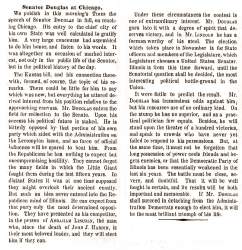Record Data
Transcription
The following text is presented here in complete form, as it originally appeared in print. Spelling and typographical errors have been preserved as in the original.
We publish in this morning’s TIMES the speech of Senator DOUGLAS in full, on reaching Chicago. His entry to the chief city of his own State was well calculated to gratify him. A very large concourse had assembled to do him honor, and listen to his words. It was altogether an occasion of marked interest, not only in the public life of the Senator, but in the political history of the day.
The Kansas bill, and his connection therewith, formed, of course, the topic of his remarks. There could be little for him to say which was new, but everything he uttered derived interest from his position relative to the approaching canvass. Mr. DOUGLAS enters the field for reelection to the Senate. Upon his success his political future is staked. He is bitterly opposed by that portion of his own party which sided with the Administration on the Lecompton issue, and no force of official influence will be spared to beat him. From the Republicans he has nothing to expect but uncompromising hostility. They cannot forget the many fields in which the Little Giant fought them during the last fifteen years. In distant States it was at one time supposed they might overlook their ancient enmity. But such an idea never entered into the Republican mind of Illinois. He can expect from that party only the most determined opposition. They have presented as his competitor, in the person of ABRAHAM LINCOLN, the man who, since the death of JOHN J. HARDIN, is their most beloved leader, and they will elect him if they can.
Under these circumstances the contest is one of extraordinary interest. Mr. DOUGLAS goes into it with a degree of spirit that deserves victory, and in Mr. LINCOLN he has a foeman worthy of his steel. The election which takes place in November is for State officers and members of the Legislature, which Legislature chooses a United States Senator. Illinois is from this time forward, until the Senatorial question shall be decided, the most interesting political battle-ground in the Union.
It were futile to predict the result. Mr. DOUGLAS has tremendous odds against him; but his resources are of no ordinary kind. On the stump he has no superior, and as a practical politician few equals. Besides, he will stand upon the theatre of a hundred victories, and speak to crowds who have never yet failed to respond to his persuasions. But, at the same time, it must not be forgotten that long possession of power cools friends and begets enemies, or that the Democratic Party of Illinois has been essentially weakened in the last six years. The battle must be close, severe, and doubtful. That it will be well fought is certain, and its results will be both important and memorable. If Mr. DOUGLAS shall succeed in detaching from the Administration Democrats enough to elect him, it will be the most brilliant triumph of his life.





